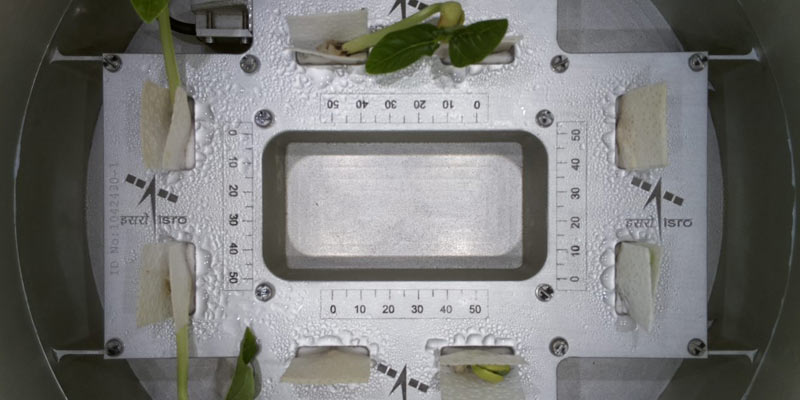- India
- Jan 07
Cowpea seedlings onboard ISRO’s POEM-4 sprout first leaves in space
Cowpea seedlings onboard PSLV-C60 POEM-4 module sprout their first leaves in space, signifying a milestone in space-based plant research.
How was it done?
• The Indian Space Research Organisation (ISRO) sent eight cowpea seeds as part of the Compact Research Module for Orbital Plant Studies (CROPS) experiment conducted by the Vikram Sarabhai Space Centre (VSSC) to study plant growth in microgravity conditions.
• The CROPS is an automated platform designed to cultivate and sustain plant life in the microgravity environment of space.
• The experiment involves growing cowpea (Vigna unguiculata) seeds in a controlled environment with active thermal regulation, simulating conditions that plants might encounter during extended space travel.
• The system monitored various parameters, including oxygen and carbon dioxide levels, relative humidity, temperature, and soil moisture, while capturing images to track plant growth.
• This setup successfully supported the germination and development of cowpea plants up to the two-leaf stage in space.
• The CROPS experiment aims to understand how plants grow in the unique conditions of space, which is essential for future long-duration space missions.
• CROPS is envisioned as a multi-phase platform to develop and evolve ISRO’s capabilities for growing and sustaining flora in extraterrestrial environments.
• Understanding on how plants adapt to microgravity is crucial for developing life support systems that can produce food and regenerate air and water for astronauts.
PSLV-C60 mission
• The PSLV-C60 mission placed two SpaDeX satellites in orbit on the night of December 30. The fourth stage of the rocket carrying the POEM-4 platform has been orbiting the Earth with 24 onboard experiments at an altitude of 350 km.
• The 44.5-metre tall PSLV-C60 rocket placed the two spacecraft — Spacecraft A (SDX01) and Spacecraft B (SDX02), each weighing 220 kg — in the right orbit of 475 km circular orbit.
Manorama Yearbook app is now available on Google Play Store and iOS App Store

